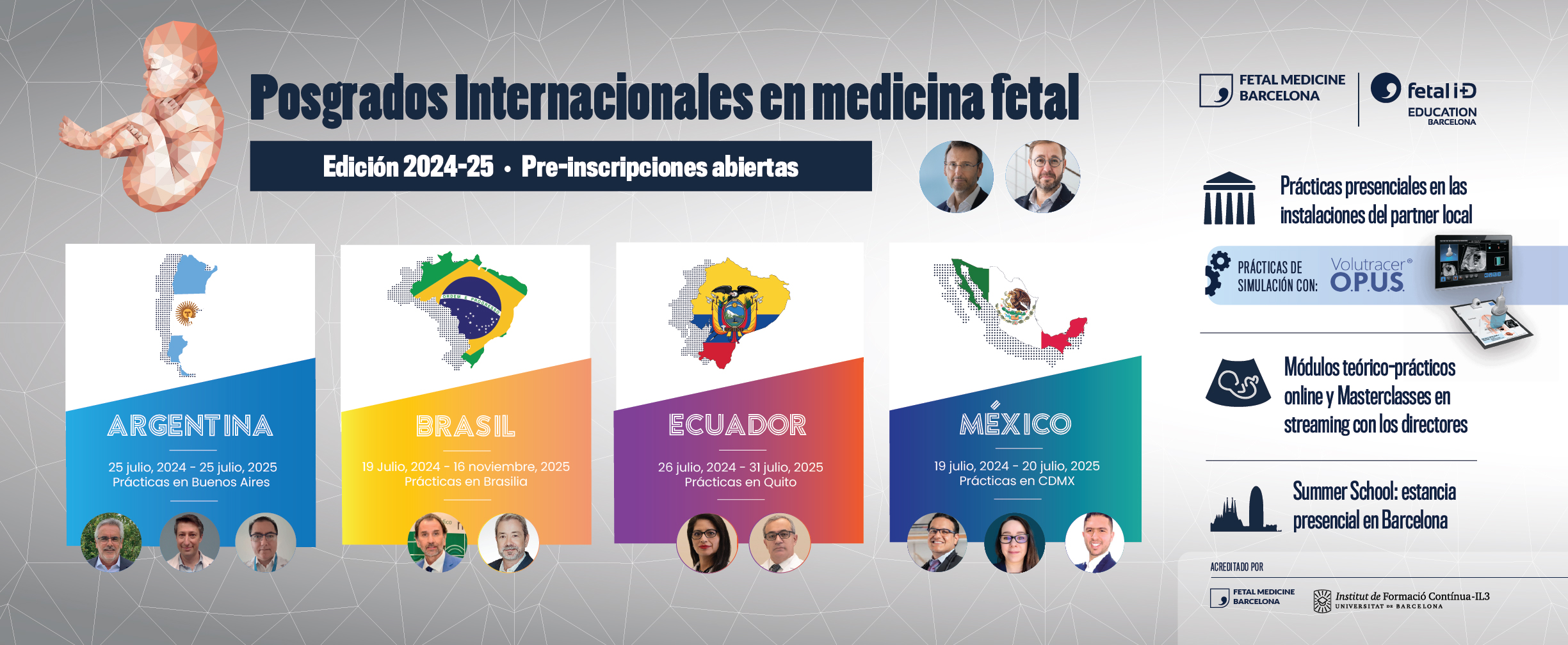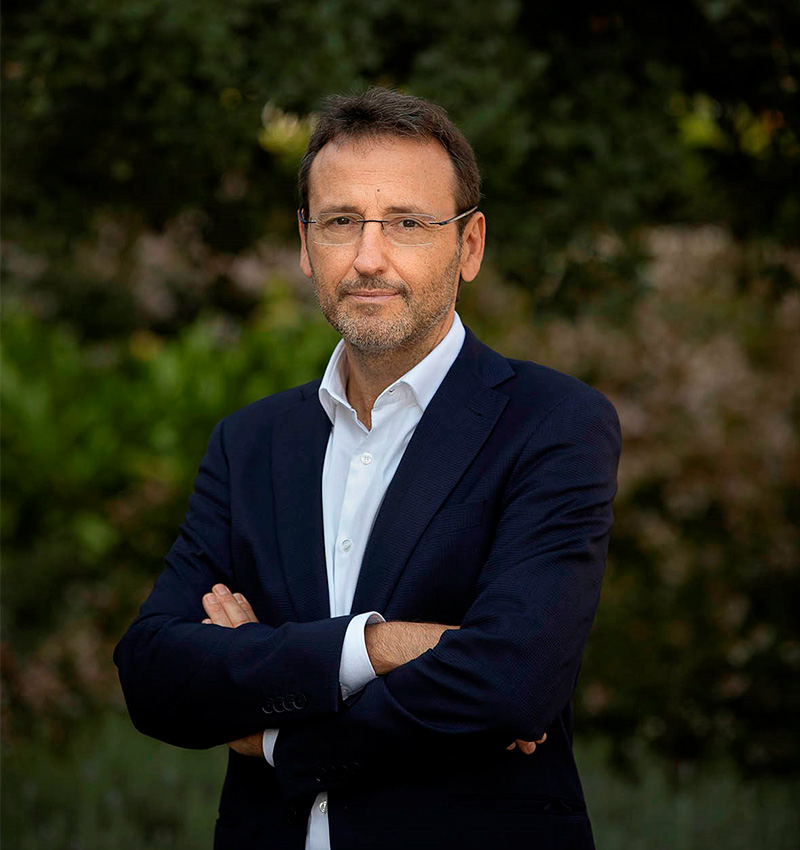
Broadly, the concept of fetal medicine can be defined as the set of preventive and/or interventional actions carried out on the fetus during gestation.
The fetal medicine specialist works, in collaboration with other experts, with the aim of improving the health and well-being of both the mother-fetus pair during pregnancy and childbirth. This is achieved through early diagnosis, counseling, and treatment of complications directly affecting the fetus, as well as collecting samples for medical examinations (such as amniocentesis or chorionic biopsy) or performing intrauterine procedures aimed at offering the fetus a better life expectancy.
The increase in available information on fetal pathology, research, and the growing technological development has increased proficiency in managing maternal-fetal complications and requires healthcare professionals to have increasingly specialized mastery and knowledge in the field.
Objective Audience
Healthcare professionals specialized in gynecology and obstetrics, with a minimum experience in maternal-fetal medicine, who wish to undergo a high-level update and in-depth training to enhance their daily practice.
General Objective
To train specialists in the management of high-risk pregnancies, with an emphasis on the diagnosis, management and treatment of the most relevant fetal congenital malformations and pathological conditions.
Teaching Structure
The postgraduate program in Fetal Medicine consists of a theoretical-practical online component and an on-site practical component.
Module 1 – Fetal morphologic and genetic diagnosis
Module 2 – Doppler and placental pathology
Module 3 – Fetal neurosonography
Module 4 – Fetal ecocardiography
Module 5 – Fetal pathology and surgery
Each module consists of the following learning components:
Course details
Course Dates:
Coming soon.
Number of Places
25 students per location.
Organization:
Fetal Medicine Barcelona – Fetal i + D Education Barcelona
Course Directors:
Eduard Gratacós
Francesc Figueras
Location:
Online classes are hosted in FMB Virtual Campus and managed by Fetal Medicine Barcelona.
The in-person practical part will take place at the local venue. (To be confirmed)
Hours:
The total course hours are 800, divided as follows:
400 hours for theoretical teaching.
350 hours for practical presential training.
Structure, Calendar and Content
Course Structure, Calendar, and Content:
The educational program consists of 5 theoretical modules covering the entirety of current fetal pathology, offering advanced training through theoretical classes and interactive platforms. Each module allows online viewing of videos with their theoretical content. These modules will have a predetermined duration and will be conducted sequentially. Each time a module is completed, it will be assessed through an online exam.
The on-site practical sessions will be conducted upon completion of each theoretical module and will be held in 3 sessions, each spanning four full days:
Session dates to be confirmed.
Any changes to the schedule will be communicated with a minimum of 10 days’ notice.
Pre-registration, selection criteria, and enrollment
Pre-registration:
Pre-registration is mandatory and must be done through our website with the following information:
– Full name
– Identification document number
– Nationality
– Country of residence
– Medical specialty and date of issuance
– Letter of motivation
– Summary of curriculum
The applicants must ensure that they meet all the requirements to participate in this selection process. Incomplete applications will not be accepted.
Once the pre-registration is received and validated, it will undergo a selection and evaluation process.
Applicants will receive a notification via email on the specified dates, confirming their acceptance and outlining the next steps.
Once admitted, candidates must sign a commitment letter to undertake the Postgraduate program and pay the enrollment fee as a down payment within the indicated deadline to secure their spot.
Cancellation of registration:
In the event of dropping out of the course, the applicant must submit a letter to the postgraduate secretary requesting the cancellation of their registration (secretariaacademica@medicinafetalbarcelona.org). There is no refund of the registration fee.
Requirements for Certificate Acquisition:
To obtain the Postgraduate Participation Certificate, the student must meet the following conditions:
– Submit the required documentation to access the course (medical degree, academic record, and copy of ID or passport).
– Attendance of 80% of the in-person sessions.
– Pass all modules separately to calculate the final grade.
– Submit a paper, approved by the supervisor, with one printed and bound copy, accompanied by a digital PDF file.
Students who successfully fulfill all the academic requirements will receive the Postgraduate Certificate issued by Fetal i+D Education Barcelona®, Spain and Fetal Medicine Barcelona.
Certification
Accreditations:
Upon successful completion and approval of the Postgraduate in Fetal Medicine, participants will be awarded the certificate of “Postgraduate in Fetal Medicine” by Fetal i+D Education Barcelona® and Fetal Medicine Barcelona.
Additionally, there is the possibility of obtaining the “Specialization Diploma in Fetal Medicine” issued by the Institut de Formació Contínua IL3 of the University of Barcelona, with 30 ECTS credits. This qualification is part of the self-taught postgraduate programs offered by the University of Barcelona, in this case, through the Institut de Formació Contínua IL3 of the University of Barcelona.
Important: The University of Barcelona IL3 qualification is subject to completing all modules, payment of university fees, as well as the submission of all required documentation by the University. Failure to submit the required documentation, incomplete or incorrect submission, implies the NON-issuance of the postgraduate degree by them, with no right to a refund of the amount paid.
Contact
For further information, feel free to contact us via the contact form or through the following means:
– By email: mmuriel@fetalmedicinebarcelona.org
– By email: epinol@fetalmedicinebarcelona.org
Course Dates:
Coming soon.
Number of Places
25 students per location.
Organization:
Fetal Medicine Barcelona – Fetal i + D Education Barcelona
Course Directors:
Eduard Gratacós
Francesc Figueras
Location:
Online classes are hosted in FMB Virtual Campus and managed by Fetal Medicine Barcelona.
The in-person practical part will take place at the local venue. (To be confirmed)
Hours:
The total course hours are 800, divided as follows:
400 hours for theoretical teaching.
350 hours for practical presential training.
Course Structure, Calendar, and Content:
The educational program consists of 5 theoretical modules covering the entirety of current fetal pathology, offering advanced training through theoretical classes and interactive platforms. Each module allows online viewing of videos with their theoretical content. These modules will have a predetermined duration and will be conducted sequentially. Each time a module is completed, it will be assessed through an online exam.
The on-site practical sessions will be conducted upon completion of each theoretical module and will be held in 3 sessions, each spanning four full days:
Session dates to be confirmed.
Any changes to the schedule will be communicated with a minimum of 10 days’ notice.
Pre-registration:
Pre-registration is mandatory and must be done through our website with the following information:
– Full name
– Identification document number
– Nationality
– Country of residence
– Medical specialty and date of issuance
– Letter of motivation
– Summary of curriculum
The applicants must ensure that they meet all the requirements to participate in this selection process. Incomplete applications will not be accepted.
Once the pre-registration is received and validated, it will undergo a selection and evaluation process.
Applicants will receive a notification via email on the specified dates, confirming their acceptance and outlining the next steps.
Once admitted, candidates must sign a commitment letter to undertake the Postgraduate program and pay the enrollment fee as a down payment within the indicated deadline to secure their spot.
Cancellation of registration:
In the event of dropping out of the course, the applicant must submit a letter to the postgraduate secretary requesting the cancellation of their registration (secretariaacademica@medicinafetalbarcelona.org). There is no refund of the registration fee.
Requirements for Certificate Acquisition:
To obtain the Postgraduate Participation Certificate, the student must meet the following conditions:
– Submit the required documentation to access the course (medical degree, academic record, and copy of ID or passport).
– Attendance of 80% of the in-person sessions.
– Pass all modules separately to calculate the final grade.
– Submit a paper, approved by the supervisor, with one printed and bound copy, accompanied by a digital PDF file.
Students who successfully fulfill all the academic requirements will receive the Postgraduate Certificate issued by Fetal i+D Education Barcelona®, Spain and Fetal Medicine Barcelona.
Accreditations:
Upon successful completion and approval of the Postgraduate in Fetal Medicine, participants will be awarded the certificate of “Postgraduate in Fetal Medicine” by Fetal i+D Education Barcelona® and Fetal Medicine Barcelona.
Additionally, there is the possibility of obtaining the “Specialization Diploma in Fetal Medicine” issued by the Institut de Formació Contínua IL3 of the University of Barcelona, with 30 ECTS credits. This qualification is part of the self-taught postgraduate programs offered by the University of Barcelona, in this case, through the Institut de Formació Contínua IL3 of the University of Barcelona.
Important: The University of Barcelona IL3 qualification is subject to completing all modules, payment of university fees, as well as the submission of all required documentation by the University. Failure to submit the required documentation, incomplete or incorrect submission, implies the NON-issuance of the postgraduate degree by them, with no right to a refund of the amount paid.
For further information, feel free to contact us via the contact form or through the following means:
– By email: mmuriel@fetalmedicinebarcelona.org
– By email: epinol@fetalmedicinebarcelona.org
Module 1
FETAL MORPHOLOGICAL AND GENETIC DIAGNOSISFetal Morphological and Genetic Diagnosis
Morphological Ultrasound
– Anatomical assessment in the first trimester
– Detectable malformations in the first trimester
– Systematic morphological ultrasound
– Basic and advanced cuts. Cardiac Doppler and M-mode
– Central Nervous System (CNS) ultrasound
– Facial ultrasound: Most common facial defects
– Congenital heart disease screening: Most frequent heart defects
– Early fetal echocardiography
– Thoracic ultrasound: Masses and pulmonary anomalies
– Abdominal ultrasound: Gastrointestinal and abdominal wall alterations
– Nephro-urological system ultrasound
– Limb anomalies and most frequent skeletal dysplasia
– Ultrasound markers of aneuploidy in the second trimester
– First-trimester genetic sonogram
Screening for Chromosomal and Genetic Anomalies
– Conventional and aneuploidy screening: Combined test
– Screening and prenatal diagnosis in multiple gestations
– Chorionic villus sampling and amniocentesis
– Karyotype: Reliability and limitations
– Free fetal DNA
– Genomic microarray
Module 2
DOPPLER AND PLACENTAL PATHOLOGY. PLACENTAL DISEASE, IUGR, PREECLAMPSIAFETOPLACENTAL DOPPLER
Foundations for the correct use of Doppler
Basic vessels: Umbilical artery and intrauterine arteries
Cerebral circulation: Middle cerebral artery and aortic isthmus
Venous vessels: Ductus venosus and umbilical vein
EARLY-ONSET DISEASE
Early screening for preeclampsia
Management of early-onset growth restriction
Management of early-onset preeclampsia
Integrated management of IUGR: Current protocol
LATE-ONSET DISEASE
Prediction and the challenge of diagnosis
Management of late-onset growth restriction
Management of late-onset preeclampsia
Second-trimester growth delay
Module 3
FETAL NEUROSONOGRAPHYNEUROFETAL ADVANCED
Anatomy and development of the CNS
Neurosonography. Systematic
Magnetic resonance. Indications.
STRUCTURAL ABNORMALITIES OF THE CNS
Abnormalities detected in the first trimester
Ventriculomegaly
Midline anomalies
Brain and posterior fossa anomalies
Vascular malformations
Intracranial cystic anomalies
Cortical development abnormalities
Myelomeningocele
ACQUIRED ABNORMALITIES
Hypoxic-ischemic lesions
Cerebral hemorrhage
Infections
Subtle brain damage and the concept of brain remodeling
GENERAL ASPECTS
Neonatal neurological assessment
Module 4
FETAL ECHOCARDIOGRAPHYINTRODUCTION
Importance and epidemiology of heart defects
Fetal echocardiography
Study of fetal cardiac function: Indications and considerations
Techniques for assessing cardiac function
SEPTAL HEART DEFECTS
Ventricular septal defect
Atrioventricular canal
Double-inlet single ventricle
LEFT HEART DEFECTS
Hypoplastic left heart, mitral atresia
Aortic stenosis/atresia
Aortic coarctation
Interrupted aortic arch
Other aortic arch anomalies: a) right aortic arch b) aberrant right subclavian artery
RIGHT HEART DEFECTS
Tricuspid atresia
Ebstein’s anomaly, tricuspid dysplasia
Pulmonary stenosis/atresia
CONOTRUNCAL HEART DEFECTS
Tetralogy of Fallot
Transposition of the great arteries
Corrected transposition of the great arteries
Double-outlet right ventricle
Truncus arteriosus
OTHER ABNORMALITIES
Pulmonary and systemic venous return abnormalities
Other heart defects: a) isomerisms b) cardiomyopathies c) tumors
Warning signs: irregular foci, asymmetry, axis deviation
Cardiac arrhythmias: irregular rhythms, tachyarrhythmias, bradyarrhythmias
Fetal therapy: cardiac intervention
Final summary and conclusions
Module 5
ADVANCED FETAL PATHOLOGY. DIAGNOSIS AND PERINATAL MANAGEMENTSURGICAL POSTNATAL MANAGEMENT ANOMALIES
Pulmonary anomalies. Congenital diaphragmatic hernia.
Abdominal wall anomalies. Bladder exstrophy. Cloacal anomalies.
Gastrointestinal anomalies.
Nephrological anomalies. Upper tract dilations.
Fetal tumors with perinatal implications. EXIT procedure.
FETAL THERAPY TRIBUTARY ANOMALIES
Thoracic anomalies. Congenital diaphragmatic hernia. Hydropneumothorax. Congenital high airway obstruction syndrome (CHAOS).
Obstruction/dilatation of the lower urinary tract.
Fetal anemia. Intrauterine transfusion. Alloimmune thrombocytopenia.
Polyhydramnios. Amniorreduction.
MULTIPLE GESTATION PATHOLOGY
Early examination of twins and selective termination.
Multichorionic gestation: approach to triplets/higher-order multiples or discordant anomaly.
Monochorionic gestation. Complications: twin-to-twin transfusion syndrome (TTTS), selective fetal growth restriction (sFGR), twin reversed arterial perfusion sequence (TRAP), twin anemia-polycythemia sequence (TAPS).
OTHER FETAL PATHOLOGY
Genetic anomalies fetal pathology. Advances in genetic diagnosis.
On-site stays
Practical content contains at least two or more of the following:
All these activities are evaluated based on the criteria specified in the academic guide for each activity.
Option 1: Hands-on with real models (minimum of 1 session per module).
Option 2: Practicum. A series of images obtained (one series per module) by the professionals in their clinical practice. The images are check against quantity and quality criteria as defined in the academic guide.
Fetal Morphological and Genetic Diagnosis
Morphological Ultrasound
– Anatomical assessment in the first trimester
– Detectable malformations in the first trimester
– Systematic morphological ultrasound
– Basic and advanced cuts. Cardiac Doppler and M-mode
– Central Nervous System (CNS) ultrasound
– Facial ultrasound: Most common facial defects
– Congenital heart disease screening: Most frequent heart defects
– Early fetal echocardiography
– Thoracic ultrasound: Masses and pulmonary anomalies
– Abdominal ultrasound: Gastrointestinal and abdominal wall alterations
– Nephro-urological system ultrasound
– Limb anomalies and most frequent skeletal dysplasia
– Ultrasound markers of aneuploidy in the second trimester
– First-trimester genetic sonogram
Screening for Chromosomal and Genetic Anomalies
– Conventional and aneuploidy screening: Combined test
– Screening and prenatal diagnosis in multiple gestations
– Chorionic villus sampling and amniocentesis
– Karyotype: Reliability and limitations
– Free fetal DNA
– Genomic microarray
FETOPLACENTAL DOPPLER
Foundations for the correct use of Doppler
Basic vessels: Umbilical artery and intrauterine arteries
Cerebral circulation: Middle cerebral artery and aortic isthmus
Venous vessels: Ductus venosus and umbilical vein
EARLY-ONSET DISEASE
Early screening for preeclampsia
Management of early-onset growth restriction
Management of early-onset preeclampsia
Integrated management of IUGR: Current protocol
LATE-ONSET DISEASE
Prediction and the challenge of diagnosis
Management of late-onset growth restriction
Management of late-onset preeclampsia
Second-trimester growth delay
NEUROFETAL ADVANCED
Anatomy and development of the CNS
Neurosonography. Systematic
Magnetic resonance. Indications.
STRUCTURAL ABNORMALITIES OF THE CNS
Abnormalities detected in the first trimester
Ventriculomegaly
Midline anomalies
Brain and posterior fossa anomalies
Vascular malformations
Intracranial cystic anomalies
Cortical development abnormalities
Myelomeningocele
ACQUIRED ABNORMALITIES
Hypoxic-ischemic lesions
Cerebral hemorrhage
Infections
Subtle brain damage and the concept of brain remodeling
GENERAL ASPECTS
Neonatal neurological assessment
INTRODUCTION
Importance and epidemiology of heart defects
Fetal echocardiography
Study of fetal cardiac function: Indications and considerations
Techniques for assessing cardiac function
SEPTAL HEART DEFECTS
Ventricular septal defect
Atrioventricular canal
Double-inlet single ventricle
LEFT HEART DEFECTS
Hypoplastic left heart, mitral atresia
Aortic stenosis/atresia
Aortic coarctation
Interrupted aortic arch
Other aortic arch anomalies: a) right aortic arch b) aberrant right subclavian artery
RIGHT HEART DEFECTS
Tricuspid atresia
Ebstein’s anomaly, tricuspid dysplasia
Pulmonary stenosis/atresia
CONOTRUNCAL HEART DEFECTS
Tetralogy of Fallot
Transposition of the great arteries
Corrected transposition of the great arteries
Double-outlet right ventricle
Truncus arteriosus
OTHER ABNORMALITIES
Pulmonary and systemic venous return abnormalities
Other heart defects: a) isomerisms b) cardiomyopathies c) tumors
Warning signs: irregular foci, asymmetry, axis deviation
Cardiac arrhythmias: irregular rhythms, tachyarrhythmias, bradyarrhythmias
Fetal therapy: cardiac intervention
Final summary and conclusions
SURGICAL POSTNATAL MANAGEMENT ANOMALIES
Pulmonary anomalies. Congenital diaphragmatic hernia.
Abdominal wall anomalies. Bladder exstrophy. Cloacal anomalies.
Gastrointestinal anomalies.
Nephrological anomalies. Upper tract dilations.
Fetal tumors with perinatal implications. EXIT procedure.
FETAL THERAPY TRIBUTARY ANOMALIES
Thoracic anomalies. Congenital diaphragmatic hernia. Hydropneumothorax. Congenital high airway obstruction syndrome (CHAOS).
Obstruction/dilatation of the lower urinary tract.
Fetal anemia. Intrauterine transfusion. Alloimmune thrombocytopenia.
Polyhydramnios. Amniorreduction.
MULTIPLE GESTATION PATHOLOGY
Early examination of twins and selective termination.
Multichorionic gestation: approach to triplets/higher-order multiples or discordant anomaly.
Monochorionic gestation. Complications: twin-to-twin transfusion syndrome (TTTS), selective fetal growth restriction (sFGR), twin reversed arterial perfusion sequence (TRAP), twin anemia-polycythemia sequence (TAPS).
OTHER FETAL PATHOLOGY
Genetic anomalies fetal pathology. Advances in genetic diagnosis.
Practical content contains at least two or more of the following:
All these activities are evaluated based on the criteria specified in the academic guide for each activity.
Option 1: Hands-on with real models (minimum of 1 session per module).
Option 2: Practicum. A series of images obtained (one series per module) by the professionals in their clinical practice. The images are check against quantity and quality criteria as defined in the academic guide.
Fetal I+D Academic Direction and Supervision
 Eduard Gratacós
Eduard Gratacós
Director of BCNatal (Hospital Clínic Barcelona and Hospital Sant Joan de Déu Barcelona), and full Professor at the University of Barcelona.
Expert in Fetal Medicine and Fetal Surgery, he has participated in the design of new techniques and procedures, and has performed over 1800 fetal interventions.
Editor-in-Chief of Fetal Diagnosis & Therapy journal.
Coordinator of more than 150 onsite and online courses, postgraduate and master’s degrees, and the Erasmus Mundus international doctorate for the European Commission.
Coordinator of >60 national and international research projects, director of 39 doctoral theses, and author of more than 485 articles published in indexed journal with an impact factor.
 Francesc Figueras
Francesc Figueras
Head of the Department of Maternal-Fetal Medicine at Hospital Clinic (Barcelona) and Full Professor of the University of Barcelona.
Master’s Degree in Research Methodology for Health Sciences by the Autonomous University of Barcelona.
Postgraduate degree in Public Health by the University of Edinburgh.
Research lines in Fetal Growth Restriction and Preeclampsia: author of ~260 articles in indexed journals (~760 Impact Factor). h-Factor 59. Author of 15 book chapters, and Editor of 6 published books.
Invited speaker to more than 200 international congresses and conferences.
Director of 14 PhD Thesis Projects.
Principal Investigator of 10 public-funded competitive research projects.

